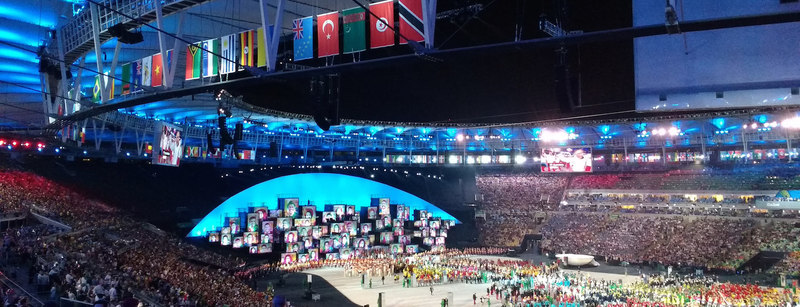World records are broken. Superstars come and go. But cliché Olympics storylines never die.
The biennial games momentarily unite countries around friendly international competition—and media organizations around the allure of drawing global audiences. Estimates on the number of journalists descending on Rio de Janeiro this month reached 30,000, and they come in addition to local media worldwide covering thousands of hometown heroes from afar. NBC, the exclusive broadcaster of the games in the United States, alone presented 6,755 hours of programming. Doping scandals, dubious economic benefits of hosting, and nail-biter badminton finishes aside, the Olympics are really the world championships of #content.
Small wonder, then, that some media narratives emerging from the games are more tired than Katie Ledecky’s competitors in the pool. Over the past two weeks, CJR judged qualifying rounds for the most overused storylines from these and past Olympics. With the closing ceremonies for the summer 2016 games set for Sunday night, we’re finally ready to award medals.
Bronze: Cold War analogies
NBC pounced after American Lilly King mocked Russian Yulia Efimova’s post-qualifying-swim finger wag from the warmup room, replaying the footage repeatedly and asking the former to elaborate poolside after her own heat. “You’re shaking your finger ‘No. 1’ and you’ve been caught drug cheating … I’m not a fan,” King said. Never mind that Efimova’s ensnarement in the byzantine anti-doping regime isn’t so clear cut. With recent news coverage of a state-sponsored doping program in Russia, coupled with tense relations between Washington and Moscow, the clash-of-civilizations narrative had already been primed.
Lilly King doesn't hold back.
Monday’s 100m breaststroke final is about. To go. Down. https://t.co/BWGaUNiTHM https://t.co/YknNeqjv6H
— NBC Olympics (@NBCOlympics) August 8, 2016
A brash 19-year-old from Indiana was taking a stand against an immoral, villainous superpower vying for world domination. It was right vs. wrong, good vs. evil, and a very simple path to gin up interest in the 100-meter breast stroke final. “Bad blood in the water injected the Olympics with what’s been missing for years—a good, old-fashioned Cold War rivalry,” the Miami Herald explained. Self-righteousness oozed from a chorus of similar reports as King went on to capture gold. U-S-A! U-S-A!
We at CJR are all for athletes trash-talking one another. But let’s tap the brakes on overlaying international rivalries, particularly outdated geopolitical frameworks, atop good old fashioned mano-a-mano athletic competition. It breeds jingoism.
“I always thought the Cold War was long in the past,” Efimova, who lives in Los Angeles, told the Russian news agency Tass after her second-place finish. “Why start it again, by using sport?”
Because it’s easy, of course.
Silver: Olympians are horny
Thousands of toned twenty-somethings cram into dorm-style apartments for two weeks—what could they possibly do in their spare time? Any self-respecting journalist has a nose for the sexy story, and for years we’ve been making the same bad jokes about going for glory in the Olympic Village.
Condoms handed out to athletes have been the subject of literally thousands of news stories over the past several Olympics, according to a kinkier-than-average Lexis-Nexis search. The Globe and Mail wrote that athletes at the 1992 summer games in Barcelona received “almost two condoms per day, which makes it one more exacting International Olympic Committee standard.” During the 1994 winter games in Lillehammer, Norway, the Associated Press reported that local “sewer workers said they had never seen so many used condoms” in the city’s pipes. One anonymous British sprinter “gasped” to The Mirror upon hearing that 630,000 condoms would be distributed to Olympians before the 2000 games: “Wow, we’re really going to have to perform.”
Meet Eric, the guy whose job it is to walk around the Olympics with a big sack of condoms pic.twitter.com/wieV9kW0N8
— Rodger Sherman (@rodger_sherman) August 7, 2016
The more recent twist on the Olympians-have-sex-too narrative—hookup apps—fits into tech verticals as well. The unfortunate and entirely predictable endpoint of this storyline came when a Daily Beast reporter potentially outted gay athletes in a feature about using Grindr in the Olympic Village.
A note to athletes: Do your thing. And to journalists: Time to try abstinence.
Gold: Here’s how many calories [INSERT ATHLETE HERE] eats per day
Digital publications have an incredible appetite for clicks, and athletes’ diets provide snackable content to satiate it. (I’m so sorry). Give me your tired competitive-eating jokes, your poor breakfast-of-champions puns. Michael Phelps has long been the main course in this genre, and his career provides a window to just how much we crave it.
“At 19, Phelps not only impresses folks with his grueling workouts,” The Baltimore Sun wrote in 2004, “but also with the thousands of calories he needs to power his 6-foot-4, 195-pound body toward medals.” Four years later, his 12,000-calorie diet had gained mythical status—“Don’t try this at home,” The Wall Street Journal warned—so much so that Men’s Health featured his “new” diet in the leadup to the 2012 games. Countless outlets circled back to Phelps once more this summer, with The Washington Post reporting that Phelps “says he doesn’t eat much anymore.” In perhaps the greatest sign of the times, the Post quotes from Phelps’ own Facebook Live broadcast as his family prepares dinner.
It’s almost as if athletes have to fuel constant physical training—something to which us desk-hunchers can’t relate. While it’s unclear whose diets will be slow-cooked for content during the 2018 games in South Korea, what is certain is that we’ll keep helping ourselves to more.
David Uberti is a writer in New York. He was previously a media reporter for Gizmodo Media Group and a staff writer for CJR. Follow him on Twitter @DavidUberti.

